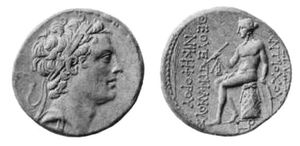|

Antiochus IV Epiphanes ([ænˈtɑi̯əkəs.ɛˈpɪfəniːz]
Αντίοχος Επιφανής, Greek: "The Shining One") (ca.
215–164 BC) ruled the Hellenistic Seleucid Empire
from 175 BC until his death.
He was a son of Antiochus III the Great and
brother of Seleucus IV Philopator. He was originally
named Mithradates, but renamed Antiochus, either
upon his ascension, or after the death of his elder
brother Antiochus. Notable events during his reign
include the near-conquest of Egypt, which was halted
by the threat of Roman intervention, and the
beginning of the Jewish revolt of the Maccabees.
Rise to power
Antiochus took power after the death of Seleucus
Philopator. He had been hostage in Rome following
the peace of Apamea in 188 BC, but had recently been
exchanged for the son and rightful heir of Seleucus
IV, the later Demetrius I Soter. Antiochus took
advantage of this situation, and proclaimed himself
co-regent with another of Seleucus' sons, the infant
Antiochus, whose murder he orchestrated a few years
later.
First invasion of Egypt
Because the guardians of Ptolemy VI of Egypt were
demanding the return of Coele-Syria, Antiochus, in
170 BC, decided on a preemptive strike against
Egypt, and invaded, conquering all but Alexandria.
He then captured Ptolemy, and agreed to let him
continue as King, but as his puppet. (This had the
advantage of not alarming Rome.) Alexandria
thereupon chose Ptolemy's brother Ptolemy Euergetes
as King. In Antiochus' absence, the two brothers
agreed to rule jointly.
Second invasion
Hence, in 168 BC, Antiochus again invaded, and
overran all Egypt, except for Alexandria, while his
fleet captured Cyprus. Near Alexandria he was met by
Gaius Popillius Laenas, who told him that he must
immediately withdraw from Egypt and Cyprus.
Antiochus said he would discuss it with his council,
whereupon the envoy drew round him a line in the
sand, and said, "Before you cross this circle I want
you to give me a reply for the Roman senate".The
implication was that, were he to step out of the
circle without an immediate commitment to withdraw
from Egypt, the Syrian king would find himself at
war with Rome. Being ambitious but not crazy,
Antiochus promised to withdraw and only then
Popillius agreed to shake hands with him.
Sack of Jerusalem
In a spirit of revenge, he organized an
expedition against Jerusalem, which he destroyed; he
put many of its inhabitants to death most cruelly.
He had soldiers enter the Jewish Temple and
slaughter a pig (which was considered "unclean" by
the Jews) on the Altar of the Lord. They set the pig
ablaze and then took the meat and tried to make some
Jewish men eat it. The men refused and he cut their
tongues out, scalped them, cut off their hands and
feet, and burnt them on the Altar of the Lord. After
this, the Jews began the war of independence under
their Maccabean leaders, defeating the armies that
Antiochus sent against them. Enraged at this,
Antiochus is said to have marched against them in
person, threatening to exterminate the nation; but,
on the way, he suddenly died(164 BC). The exact
causes of the Jewish revolt, and of Antiochus'
response to it, are uncertain; the Jewish accounts
are in the Books of the Maccabees, and the
successful revolt is commemorated by the holiday of
Hanukkah.
The Jews he oppressed mockingly referred to him
as Antiochus Epimanes ("The Mad One") in a play of
his name Epiphanes [1]
Final years
His last years were spent on a campaign against
the rising Parthian empire, which seems to have been
initially successful, but which terminated upon his
death.
The reign of Antiochus was a last period of
strength for the empire, but in some way it was
fatal; since he was an usurper, and left his infant
son Antiochus V Eupator as his successor,
devastating dynastic wars followed his death.
See also Book of Daniel
Preceded by
Seleucus IV Philopator
Succeeded by
Antiochus V Eupator
Footnotes
- Encyclopædia Britannica Online: Antiochus IV
Epiphanes
|